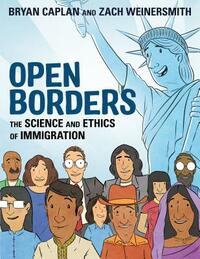You need to sign in or sign up before continuing.
Take a photo of a barcode or cover
Brian Caplan presents a compelling, thorough, and clear case for Open Borders not just in the US but worldwide.
fast-paced
informative
inspiring
fast-paced
I'm convinced. This is a great series of well-researched arguments in favor of open immigration, with allowances for "keyhole" solutions to appease even the staunchest of immigration opponents. It is presented in graphic-novel format, which makes the somewhat dry material much more fun to read. Great illustrations!
A fun introduction to this position that I didn't know much about beforehand. With the format it's inevitable that it only scratches the surface of each of the arguments and counterarguments, which wasn't enough for me to truly trust the point he is trying to make without digging deeper. But as an overview of what people on both sides are generally saying, it does a great job.
The benefits of open borders and unrestricted immigration from the perspective of a preachy libertarian.
Regardless of what your opinion is on immigration, the illustrations in this book are very well done. Caplan addresses many arguments against open borders and finds solutions. His arguments on economic growth are compelling and he does address that most low-skilled young immigrants are still a net gain for American capital, although he does not address a glaring issue: that not everyone who immigrants to the US will want to work. He also swings and misses in regards to what "culture" is and whether or not culture is worth preserving. His section on IQ was also weak. Full review soon.
informative
inspiring
lighthearted
The science of why open borders is sensible policy through an engaging book of comics.
I initially thought this book was going to be geared towards young readers but I was glad every concept was presented in a clear way for the average adult.
I already was convinced but the facts on facts on facts just help bolster your belief.
I like how the end chapters dream of a day where the US has an open border policy with Canada similar to the EU.
A hopeful, informative, engaging read about a polarizing subject.
I initially thought this book was going to be geared towards young readers but I was glad every concept was presented in a clear way for the average adult.
I already was convinced but the facts on facts on facts just help bolster your belief.
I like how the end chapters dream of a day where the US has an open border policy with Canada similar to the EU.
A hopeful, informative, engaging read about a polarizing subject.
When the Berlin Wall came down, the whole world rejoiced. Onlookers said, “At last, the East Germans will be free”—not “The West Germans are about to lose their freedom to a horde of communist immigrants.”[1]
Caplan believes that if someone wants to come to the US, our default response should be to let them. He clarifies the kind of “open borders” he supports as follows:
Critics occasionally equate “open borders” with “no borders,” but these are distinct proposals; an open borders regime could still have border checkpoints, require passports, and so on. The acid test, in my view, is that an open borders regime does not subject foreigners to any mobility restrictions more stringent than natives face. Thus, if a foreigner commits a crime warranting incarceration, an open borders regime could impose the lesser punishment of exclusion. Similarly, if a foreigner has a contagious disease warranting quarantine, an open borders regime could impose the lesser precaution of exclusion.[2]
There are two basic prongs to his argument, one ethical and one economic:
- Immigrating to rich countries would dramatically improve the lives of a large number of people currently living in poor countries, and we cannot morally justify stopping them.
- Letting them in would actually make us a lot richer, too.
For me, the ethical reasons are the decisive ones. Immigration restrictions are fundamentally based on violence: people who do not adhere are forcibly imprisoned or deported. I think violence should be assumed to be wrong by default unless very compelling reasons for its necessity have been presented. Do we have compelling reasons to keep most people out of the US by violence?
Some arguments for keeping people out seem morally bankrupt even if you grant their empirical assumptions. Suppose that, contrary to Caplan’s economic arguments, more immigration would make current US residents much poorer and make our lives worse. That would suck, but it wouldn’t justify the use of force. I don’t get to tell people from a neighboring city that they can’t live in my city just because I’m afraid they’ll compete with me—or my (hypothetical) children—for jobs. It seems equally unjustifiable to tell people they can’t live in my country because I don’t want to compete with them. (There might be an argument that it’s even less justifiable: being kept out of the entire US puts you at a much greater disadvantage in life than merely being kept out of, say, Seattle would.)
Caplan addresses several other concerns, including:
- Too many immigrants arriving at once might cause chaos and overwhelm our infrastructure and institutions. Caplan does not think this would happen, because he believes immigration would only “gradually snowball”[3] if borders were opened up. He points to the history of migration from Puerto Rico into the continental US as evidence.
- Some people worry that immigrants cost more in public services than they contribute via taxes. Caplan cites studies indicating the opposite is true for most groups of immigrants (low-skilled older immigrants are the exception).
- The fear I hear the most is that immigration leads to increased crime. Caplan cites evidence to the contrary: “Naturalized immigrants are model citizens, with one-fifth natives’ incarceration rate.”[4]; “Non-citizens’ incarceration rate almost exactly matches natives’.”[5]; “In 2016, the National Academy of Sciences scrutinized decades of research, concluding ‘the presence of large numbers of immigrants seems to lower crime rates.&rsquo”[6].
- Would massive immigration sway elections? Caplan admits that “Democratic presidential candidates now do about ten percentage points better with immigrants than with natives,”[7] but argues that this needn’t worry Republicans because immigrants’ views on actual issues are very in line with natives’ views. Low-skilled immigrants are an exception, though. Caplan gives reasons to doubt that they have much influence on public policy anyway, and points out that their descendants’ views are in line with natives’ views, but I’m not sure his reply on this point will be very compelling for people who aren’t already sympathetic to open borders.
- Does immigration threaten to destroy cultural cohesion? Caplan argues that descendants of immigrants have a strong tendency to assimilate, citing the remarkably high English fluency rate of even first-generation immigrant kids.
One chapter is devoted to the notion that, even if you think some of the concerns motivating limited immigration are valid, there are other ways to address those concerns. We could charge immigrants an entry fee or make them pay higher tax rates; restrict their access to public services; make them pass language or cultural literacy tests; make them jump through extra hoops to attain citizenship and the right to vote; etc. Caplan’s not advocating for any of those policies, just identifying them as potential compromises that would be improvements over the status quo. Because the status quo is pretty extreme; lots of people simply have no legal route by which to live in the country they want to live in. Even offering them an unfairly shitty route would be an improvement.
The book is illustrated by the creator of SMBC, so there are some pretty funny jokes sprinkled throughout the drawings.
[1] Bryan Douglas Caplan, Zach Weinersmith, and Mary Cagle, Open borders: the science and ethics of immigration, ed. Calista Brill and Rachel Stark, First edition (New York, NY: First Second, 2019), 137.
[2] Ibid., 218.
[3] Ibid., 46.
[4] Ibid., 92.
[5] Ibid.
[6] Ibid., 93.
[7] Ibid., 114.
(crosspost)



